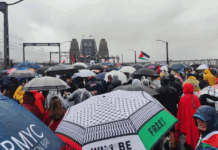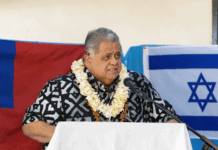
Citizens, journalists, lawyers and international media personalities have joined together in an international open letter to Australian Prime Minister Scott Morrison, calling on the Canberra government to act now to “defend the beleaguered rights” of Wikileaks founder Julian Assange.
“Australia must do all in its power to ensure that Britain rectifies, in each way described, its treatment of an Australian citizen who happens to be the world’s most famous publisher,” says the open letter.
“It also means that extraterritorial prosecution must be vigorously opposed, and with particular respect to Assange, by way of openly and preemptively refusing his extradition from Australia to the US.”
READ MORE: RSF concerned about ‘lack of evidence’ in US extradition case against Assange
Signatories include Pentagon Papers whistleblower Daniel Ellsberg; barrister and Law Council of Australia former president Fiona McLeod, SC; South Australia Senator Rex Patrick; inaugural 7:30 Report presenter Jane Singleton; Nobel Peace laureate Mairead Maguire; William Binney, former technical director of the US National Security Agency; author and Australian Financial Review columnist Brian Toohey; former SBS World News presenter Mary Kostakidis; Pacific Journalism Review “Frontline” editor and investigative journalist Wendy Bacon; and award-winning journalist and filmmaker John Pilger.
The open letter reads:
Dear Prime Minister,
In accordance with its duty to every citizen, the Australian government must act to defend the beleaguered rights of Julian Assange.
Political reaction has caused him to be sought by the US, where he faces an effective death sentence of 175 years in prison for his role in publishing its internal documents. These include State Department communications and army logs of the wars it led in Afghanistan and Iraq, the latter of which was declared illegal by the UN Secretary General.
To rationalise this on account of Wikileaks’ impacts is to condone punishment for releasing facts disseminated by major outlets. This is incompatible with press freedom, which in times of peace and conflict alike, hinges on assurance that it will not be traded off.
Free expression is integral to transparency, without which democracy is necessarily a treacherous illusion. Genuine security thus stands or falls with the availed freedom to render power transparent.
Conversely, war of aggression and oppressive surveillance amount to fake security, like the silencing of those who expose them, which as a rule is on false pretexts.
In 2010 a US official was told in a State Department briefing that the impact of the leaks “was embarrassing but not damaging,” according to Reuters.
Courthouse News reported in 2013 that a former brigadier-general heading the Information Review Task Force investigating the same leaks testified that they “did not lead to the deaths of any military sources.”
Maligned character
Assange’s character has been much maligned, but is not subject to legislation and is accordingly no justification for extradition. Yet his rendition to the US would be a precedent to weigh on all of good character, especially those who align with him in vital publishing.
Britain attempted to extradite him to Sweden over allegations of sexual violence, though Women Against Rape said “we do not believe that is why he is being pursued.”
In November 2019, after nine years of Assange being cast as a suspected rapist, the preliminary investigation was dropped for a third time. The last two of them spurred the impropriety of a press conference furthering a prosecutor’s contentions at additional expense to his reputation and without provision for his defence counsel to respond.
He was never charged, and despite arguing in court that he would likely be charged in Sweden, poverty of evidence moved the Swedish prosecutor to withdraw their European arrest warrant in 2013, before receiving the exculpatory testimony that Assange waited until 2017 for an opportunity to provide. The investigation only continued in the meantime due to pointed intervention of the British Crown Prosecution Service: “Don’t you dare get cold feet!!!”
The UK persisted in refusing to let him leave the embassy without facing arrest and a UN panel ruled that such effective detainment was arbitrary.
In cooperation with Britain, a new president in Ecuador complied with a written request from the US House Committee on Foreign Affairs to deliver Assange “to the proper authorities”.
Even the Ombudsman of Ecuador confirmed this expulsion as a breach of asylum laws, among others, and listed the violated articles.
Breaching bail
Britain arrested and convicted him for breaching bail, citing failure to appear at a police station when requested.
That request was issued with disrespect for the universal right to seek asylum, more than a week after the embassy received him.
He was given a maximal sentence and endured the harshest prison conditions, simply for having sought and received asylum from another UN member state. Bail violation and absconding only apply if there is a breach of conditions without “reasonable cause.” Such causes naturally include asylum, which takes legal priority over extradition, including connected bail matters and for clearly justified reasons. Nevertheless, the judge was more interested in pronouncing him a narcissist.
The US indictments against him only concern 2010 material from Wikileaks, and reveal no new information. Like the bail issue and Swedish investigation, such matters were evaluated by the UN Working Group on Arbitrary Detention for sixteen months prior to its ruling.
Its independent findings remain applicable, and cannot be rivaled as authoritative, expert opinion on how Britain is constrained to act by its own ratification of covenants. Such binding legal protection of human rights would be absurd if optional.
In May this year, Nils Melzer, the UN Special Rapporteur on Torture, presented Britain, Ecuador, Sweden and the US with evidence of their extensive violations of legal protocol and duty concerning Assange.
He also detailed the consequences of this, including emaciation, cognitive abnormalities and severe psychological suffering, as well as mortal risk if the strain placed on him was not immediately reduced.
Health condition deteriorated
The opposite occurred and his condition has strikingly deteriorated.
More than a hundred doctors have petitioned the UK Home Secretary, Priti Patel, as well as the Secretary of State for Justice and also the Lord Chancellor, to end this abuse and transfer him to a suitable hospital, in accordance with Professor Melzer’s explicit and urgent report to Patel’s predecessor.
To date, the UK Government has failed to respond in any way to the UN Rapporteur on Torture, other than by issuing a single Tweet and denying impropriety in two paragraphs, four months later.
This conduct is a brazen abrogation of absolute investigative and remedial obligations, under international and human rights law signed by Britain.
The UK government is still resisting the hospital transfer request, which is a scandal that Australia will be increasingly culpable in, to the extent that it remains a passive witness.
No law or protocol prevents an Australian statesman from asking a British counterpart to relocate its citizen to a required university teaching hospital. Nor would it be possible in this case to refuse that request in a credible or politic way.
Julian Assange should not spend another day as a publisher held on remand, withering in a poorly funded maximum-security prison and without proper resources for his legal defence.
No fair trial
Extradition to the US would not culminate in a fair trial or bring an end to the torture, but likely make it worse and permanent, in Melzer’s researched, documented and mandated estimation, as a Professor of International Law at the University of Glasgow.
Relevant proceedings should be ended immediately by the UK Crown Prosecutor, who has the discretionary power to do this and like any person acting on the government’s behalf, must abide by ratified international law in that role. The Home Office should also commit in public to refuse any potential extradition directive from the judiciary.
All branches and parts of the implicated governments are obliged to uphold the spirit, as well as legally bound to the letter of pertaining international law.
This implies that Australia must do all in its power to ensure that Britain rectifies, in each way described, its treatment of an Australian citizen who happens to be the world’s most famous publisher.
It also means that extraterritorial prosecution must be vigorously opposed, and with particular respect to Assange, by way of openly and preemptively refusing his extradition from Australia to the US.
This should occur in tandem with securing him the option, with itinerary of his choosing, to be availed of diplomatic escort to a friendly Australian doorstep.
There is no latitude for a free and dignified nation to deviate from these positions, let alone the country of his birth.
Human rights not negotiable
In regards to US relations, no alliance can remain special without healthy and respected boundaries.
Foremost among these are sovereignty and human rights, neither of which are negotiable.
Parliamentary groups in support of Assange in Germany, Italy and the European Union as well as here in Australia are keenly mindful of that, and naturally gaining momentum.
London’s embarrassingly political prisoner has endured over three thousand days of continuous detainment, and may not make it through the coming ones.
Intervention can be appropriate, and never more than now.
Bring Julian Assange home, safely and speedily.













































